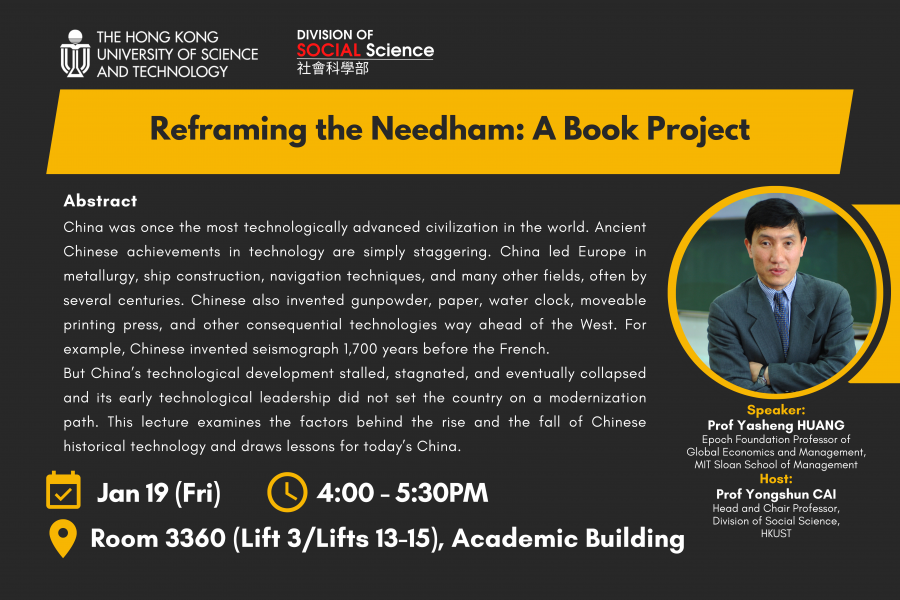China was once the most technologically advanced civilization in the world. Ancient Chinese achievements in technology are simply staggering. China led Europe in metallurgy, ship construction, navigation techniques, and many other fields, often by several centuries. Chinese also invented gunpowder, paper, water clock, moveable printing press, and other consequential technologies way ahead of the West. For example, Chinese invented seismograph 1,700 years before the French.
But China’s technological development stalled, stagnated, and eventually collapsed and its early technological leadership did not set the country on a modernization path. This lecture examines the factors behind the rise and the fall of Chinese historical technology and draws lessons for today’s China.
Yasheng Huang is a professor and holds the Epoch Foundation professorship of global economics and management at MIT Sloan School of Management. During 2023-4, he is serving as a visiting fellow at the Kissinger Institute at the Woodrow Wilson Center in Washington, DC. From 2013 to 2017, he served as an associate dean in charge of MIT Sloan’s global partnership programs and its action learning initiatives. His previous appointments include faculty positions at the University of Michigan and at Harvard Business School.
Professor Huang is the author of 11 books in both English and Chinese and of many academic papers (such as on regulatory transparency, historical autocracy, statistical falsifications, tax, financing, sectoral and regulatory biases, history of reforms and strategy, political economy of controls, etc.) His book, The Rise and Fall of the EAST: How Exams, Autocracy, Stability, and Technology Brought China Success, and Why They Might Lead to its Decline, is published by Yale University Press in 2023. He is collaborating with other scholars on a book project, Reframing the Needham Question, based on a comprehensive database on Chinese historical inventions (under contract at Princeton University Press). His book, Statism with Chinese Characteristics (under contract at Cambridge University Press), examines economic reforms and economic performance of China since 1978. Professor Huang is a co-Principal Investigator in a large-scale multi-disciplinary research project on food safety in China.
Outside of his academic research, Professor Huang has written for New York Times, Wall Street Journal, Financial Times, Foreign Policy and Foreign Affairs, and Project Syndicate, Caixin and Caijing. He is working on several policy projects related to US-China relations. He was one of the coauthors of MIT’s report, “University Engagement with China: An MIT Approach” and he is a co-chair of an implementation committee of that report. He is a member of a taskforce at Asia Society on US-China policy and a member of Brookings-CSIS Advisory Council on Advancing US-China collaboration. During 2023-4, he is a visiting fellow at the Kissinger Institute at the Woodrow Wilson Center in Washington DC.
Professor Huang founded and runs China Lab, ASEAN Lab and India Lab, which have provided low-cost consulting services to hundreds of small and medium enterprises in these countries. From 2015 to 2018, he ran a program in Yunnan province to train women entrepreneurs (funded by Goldman Sachs Foundation). He has held or received prestigious fellowships such as National Fellowship at Stanford University and Social Science Research Council-MacArthur Fellowship. National Asia Research Program named him one of the most outstanding scholars in the United States conducting research on issues of policy importance to the United States. He has served as a consultant at World Bank, Asian Development Bank and OECD, and serves on advisory and corporate boards of non-profit and for-profit organizations. He is a founding member and is serving as the president of Asian American Scholar Forum, an NGO dedicated to open science, protection of rights and well-being of Asian American scholars.
Host: Prof Yongshun CAI, Head and Chair Professor, Division of Social Science, HKUST

